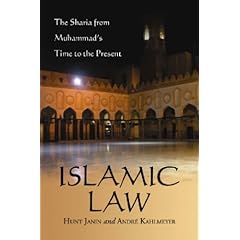 Archbishop of Canterbury, Highest Anglican of The Church of England, made the case for Britain to accept incorporating Sharia Law as the future. Shocking to some, mind bending to others, Dr. Rowan Williams, the 104th person since 597 to hold the "The Most Reverend Father in God, Forenames, by Divine Providence Lord Archbishop of Canterbury, Primate of All England and Metropolitan" job, decided to speak his mind, minus reservations, about the state of British religious legal doctrine to Anglicans around the globe. The Archbishop declared Sharia laws were much like off key music in a church, inevitable - his actual word was "unavoidable".
Archbishop of Canterbury, Highest Anglican of The Church of England, made the case for Britain to accept incorporating Sharia Law as the future. Shocking to some, mind bending to others, Dr. Rowan Williams, the 104th person since 597 to hold the "The Most Reverend Father in God, Forenames, by Divine Providence Lord Archbishop of Canterbury, Primate of All England and Metropolitan" job, decided to speak his mind, minus reservations, about the state of British religious legal doctrine to Anglicans around the globe. The Archbishop declared Sharia laws were much like off key music in a church, inevitable - his actual word was "unavoidable".Dr. Williams' speech to England's Royal Courts of Justice also caused tremors in Australia where emphatic denouncements commenced immediately. It causes brain bruises to imagine the Archbishop sharing what implementing Sharia law means to Her Majesty over some righteous scones and chamomile tea.
Dr Rowan Williams said the UK had to "face up to the fact" some citizens did not relate to the British legal system.
He said adopting parts of Islamic Sharia law could help social cohesion.
For example, Muslims could choose to have marital disputes or financial matters dealt with in a Sharia court.
 From Number 10 Downing Street, where the Never-ending Global War on Terror™ ® (Bush patent pending) is being waged in tandem with the USA, Prime Minister Gordon Brown rushed to say no, just no, to the Archbishop's serious musing aloud to the BBC's Radio 4 about the citizenry being subjected to necessary changes in legal practice from its Magna Carta underpinnings to embrace Sharia law in certain circumstances. In fairness, the Archbishop sought ways to integrate modern societal demographic changes and differing religious traditions from another major Faith, Islam, into British society and its legal community.
From Number 10 Downing Street, where the Never-ending Global War on Terror™ ® (Bush patent pending) is being waged in tandem with the USA, Prime Minister Gordon Brown rushed to say no, just no, to the Archbishop's serious musing aloud to the BBC's Radio 4 about the citizenry being subjected to necessary changes in legal practice from its Magna Carta underpinnings to embrace Sharia law in certain circumstances. In fairness, the Archbishop sought ways to integrate modern societal demographic changes and differing religious traditions from another major Faith, Islam, into British society and its legal community. With rhetoric equal in height to the spires of the centuries old Canterbury, he notes other accommodations made in Britain while denouncing some of the odious interpretations of Sharia Law practiced by Muslim extremists like Afghanistan's Taliban. Prudence in politically presenting his point was missing in action as his thoughtful remarks caught everyone off guard as the speech became quickly condensed into the standard sound byte, squeezing the life out of his meaning and derailing insights into his interpretation of the humanistic nature of the Sharia system.
With rhetoric equal in height to the spires of the centuries old Canterbury, he notes other accommodations made in Britain while denouncing some of the odious interpretations of Sharia Law practiced by Muslim extremists like Afghanistan's Taliban. Prudence in politically presenting his point was missing in action as his thoughtful remarks caught everyone off guard as the speech became quickly condensed into the standard sound byte, squeezing the life out of his meaning and derailing insights into his interpretation of the humanistic nature of the Sharia system.The tarring and feathering of the Oxford scholar is gathering steam as his point becomes lost in a larger more toxic political context. The how of what he expressed just drowned the what so the debate becomes about him and his views, rather than which groups for which rationales get a tolerance exemption.The archbishop compared allowing Muslims to take carefully defined issues to their own religious courts to the established practice among Orthodox Jews here of referring religious disputes to rabbinical courts.
Roman Catholics might also benefit from what he called “plural jurisdiction” in matters affecting religious conscience, he said. He noted that the Church of England, formally headed by the monarch, also has its own ecclesiastical courts.
“Nobody in their right mind,” the archbishop told the BBC, “would want to see in this country the kind of inhumanity that sometimes appears to be associated with the practice of the law in some Islamic states — the extreme punishments, the attitudes to women as well.”
But equally, he said, “I don’t think we should instantly spring to the conclusion that the whole of that world of jurisprudence and practice is somehow monstrously incompatible with human rights simply because it doesn’t immediately fit with how we understand it.”
 Geoffrey Chaucer wrote the first Canterbury Tales montage of 14th century Middle as a diverse English swearing tourists on a pilgrimage telling each other stories about life and all of its travails. Fast forward to today with a vantage point of history,
Geoffrey Chaucer wrote the first Canterbury Tales montage of 14th century Middle as a diverse English swearing tourists on a pilgrimage telling each other stories about life and all of its travails. Fast forward to today with a vantage point of history,  England's high priest shared his thoughts on Islam and its version of the rule of law and how it should be applied. Islamic Law: The Sharia from Muhammad's Time to the Present gives a or one perspective from Hunt Janin & Andre Kahlmeyer.
England's high priest shared his thoughts on Islam and its version of the rule of law and how it should be applied. Islamic Law: The Sharia from Muhammad's Time to the Present gives a or one perspective from Hunt Janin & Andre Kahlmeyer.












No comments:
Post a Comment